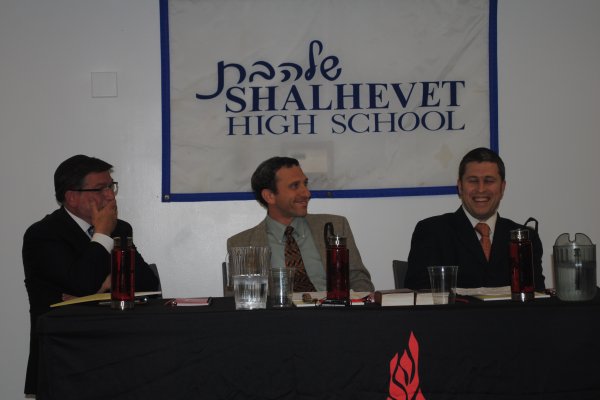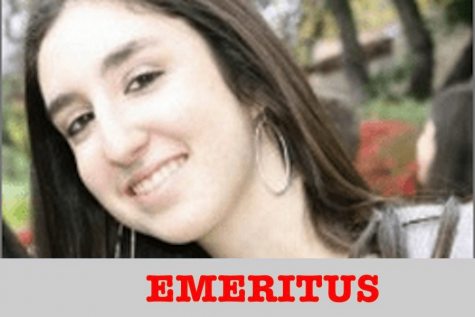Local rabbis apply Modern Orthodoxy to tough issues

Rabbis of the three leading Modern Orthodox shuls shared a light moment during an otherwise intense discussion of issues ranging from how to treat gays to skateboards on Shabbat. From left, Rabbi Elazar Muskin of Young Israel of Century City; Rabbi Yosef Kanefsky of B’nai David-Judea; and Rabbi Kalman Topp of Beth Jacob.
January 2, 2011
At a first-ever school Modern Orthodoxy symposium, three rabbis who lead shuls that are home to many Shalhevet families captured students’ attention when they agreed that they wanted to welcome gays into their synagogues.
Rabbi Yosef Kanefsky of B’nai-David Judea Congregation, Rabbi Elazar Muskin of Young Israel of Century City, and Rabbi Kalman Topp of Beth Jacob Congregation responded to students’ pre-submitted questions Dec. 2, offering perspectives on some of Modern Orthodoxy’s central issues in an afternoon assembly in the Beit Midrash.
“They all had similar opinions, and were very eloquent,” said sophomore Rose Bern, who added that Rabbi Kanefsky had “beautifully” answered the question she had submitted on the treatment of gays. “I really liked them all, they were very personable.”
In addition to Orthodox attitudes toward homosecxuality, other questions explored women’s role in Orthoox Judiasm, what is and isn’t permitted on Shabbat, and what the definition of Modern Orthodoxy is and should be. Judaic Studies Principal Rabbi Ari Leubitz and teachers Noam Weissman and Jason Feld had planned the assembly, which was attended by faculty members and students grades 10-12 in the honors Judaic Studies track.
Sophomore Daniel Schwartz moderated the discussion, and the rabbis sat next to each other at a table in the center of the room. Each took a few minutes to present an opinion in response to each question, often citing the late Rabbi Joseph Soloveitchik, a founder and inspiration for Modern Orthodoxy.
Although there was no direct student interaction with the rabbis, occasional chuckles or momentous buzzing after a shocking statement made it clear that students were catching every word. The room was very quiet as most students were taking down notes about the event for their Gemara class.
Women’s ritual life in Judaism, particularly in the synagogue, was the most controversial topic.
Rabbi Muskin said that he admired women who want to “mature in the Talmud” but “unless you want to create an earthquake that’s so devastating,” women should not have active ritual roles in the synagogue. This presumably would include laining, leading services, being called to the Torah for an aliyah, or serving as rabbi.
“Rabbi Soleveitchik worried that if men and women become equal in the synagogue, you will destroy foundations,” said Rabbi Muskin, his voice biting into the silence of the room. “The Reform and Conservative movements are paying for it.”
He said Reform and Conservative synagogues, which make no difference between men’s and women’s roles, have fewer and fewer men attending, and that groups like the Jewish Federation of Greater Los Angeles are even having meetings about the problem.
Rabbi Muskin said that Judaism is home-based, and that women’s ritual roles are primary in the home.
“The real Judaism doesn’t take place in the synagogue,” said Rabbi Muskin. “Even on Yom Kippur, the sermon we do is an imitation of the church. We are a home-based religion and in the ritual life of the home, 100 percent, my wife is in charge.”
But all the rabbis advocated women learning Talmud and said that Modern Orthodoxy has the responsibility to remove obstacles from the path of women.
“It’s wonderful when a woman says she wants to learn Talmud,” said Rabbi Topp. “It’s inspiring when someone wants to have intellectual growth.”
“No individual is more superior to another person,” he added.
Rabbi Kanefsky opened his remarks by saying “all roadblocks to women’s learning should be cleared away as fast as possible.”
But then he, too, raised the issue of men leaving Reform and Conservative Judaism because women’s leadership in the synagogue dominated there. He said this was a serious problem because halachically, men are responsible for ensuring communal prayer.
“It’s a reality being recognized,” said Rabbi Kanefsky. “The flight of men from egalitarian synagogues makes me think of where the line should be brought — something to chew on.”
There was a sudden nervous charge among students when the question regarding how the community should treat gays arose, and the three admitted that the question had taken them by surprise. Rabbi Topp and Rabbi Muskin hesitated while Rabbi Kanefsky decidedly went up to the podium.
When Rabbi Kanefsky had finished, the other two rabbis were offered a chance to speak, but Rabbi Muskin said – to chuckles all around – “He said it all, we’re all good.”
Rabbi Kanefsky said that while the Torah could not be clearer on its prohibition of homosexual relations, it’s important that gay Jews feel comfortable in the Orthodox community and have a home in the shul. Without that home, he said, they might stop observing mitzvot, thus losing “our path to holiness,” he said.
“How can we create a community so that someone who is homosexual feels at home?” said Rabbi Kanefsky. “The crisis comes when they feel that they have no choice but to leave the Orthodox community.”
The rabbis all stressed that Modern Orthodoxy follows the halachic mitzvot and does not represent a “lighter” version of Orthodox Judaism. Rather, they said that Modern Orthodoxy balances the secular society with Jewish values unlike other Orthodox sects that repudiate the secular.
“Modern Orthodoxy insists that you use your brain,” said Rabbi Muskin. “It doesn’t say that we’re going to live in a cave and not listen to the world around us.”
Rabbi Topp agreed, saying that Modern Orthodoxy values getting a degree in the arts and sciences, and acknowledges the development of the state of Israel.
“We’re committed to mitzvot,” Rabbi Topp said. “It’s not a watered down version of Judaism. It’s contemporary, it incorporates modern sensitivity.”
Rabbi Kanefsky said that the movement promotes tolerance between Judaism’s religious sects.
“[We] figure out a way to integrate with fellow Jews who aren’t Orthodox, giving respect to people we disagree with,” said Rabbi Kanefsky.
Asked where people should draw the line regarding what they are allowed to do on Shabbat – like rollerblading and watching a TV set that’s already on — the rabbis emphasized that focusing on do’s and don’ts will undermine the spirit of Shabbat.
Rabbi Topp compared Shabbat to a bride and a queen.
“There’s a warmth and closeness to Shabbat,” Rabbi Topp said. “[But] it’s a regal queen we obey. The do’s and don’ts are for us to rediscover what’s really meaningful to us.”
Rabbi Muskin called the topic question “disturbing.”
“Shabbat can’t be ‘can I or can’t I,’ and that’s all Shabbat has become to the American Modern Orthodox Jew,” Rabbi Muskin said. The right way to think of it, he said, is, “It’s a rendezvous with God.”
Asked whether Modern Orthodoxy is the right fit for every Jew, Rabbi Muskin said yes.
“If taught correctly, it is the right fit,” said Rabbi Muskin. “The problem is that we haven’t been able to teach it right.”
However, Rabbi Kanefsky was more cautious.
“[We] have not been able to demonstrate that having a halachic life makes you better people,” said Rabbi Kanefsky.
He added that the movement is losing momentum because people haven’t been able to hold it to its standards.
“We’re at a point where Orthodox Judaism will be a minority expression,” Rabbi Kanefsky said. “It’s very hard to be people of faith and people of science.”
Rabbi Topp shared Rabbi Kanefsky’s view that Modern Orthodoxy is not for everyone.
“I don’t know myself as a rabbi just for the Orthodox,” said Rabbi Topp. “We have to acknowledge the reality that the majority of Jews aren’t Orthodox.”
When the rabbis were asked whether they thought Judaism was the only correct religion, Rabbi Muskin responded strongly.
“If it’s not, then what am I doing here? I’m a phony,” said Rabbi Muskin, adding that there’s still a value to anyone’s belief in a God. “It’s the correct religion.”
Rabbi Kanefsky chose to quote England’s Chief Orthodox Rabbi Jonathan Sacks, saying, “No religion has a monopoly on truth.”
“I think that Judaism is not the religion for most people,” said Rabbi Kanefsky, explaining how Judaism emphasizes that converts should be absolutely sincere about their decision.
After the symposium, students in the hallway could be heard talking to their friends about the rabbis’ statements. Many said that they were impressed with the honesty of the rabbis.
“I liked Muskin because on the Shabbat issue he came straight out and said you should not be asking the do’s and don’ts of Shabbat,” said junior David Rokah. “He was passionate about it. He was willing to say what other people disagreed with. It was fascinating, really.”
Students said that they enjoyed being able to hear the opinions of three rabbis from their community on relevant issues.
“The topics were most relevant,” said senior Toby Bern.
Junior Justin Brand-Sarif agreed.
“It was enlightening,” he said. “It brought answers to some questions I haven’t gotten answered.”
Rabbi Leubitz called the symposium a success. He said the reason only Honors students were present was because they were currently studying about Modern Orthodoxy in their classes.
“We’re a Modern Orthodox school, [and] to be able to articulate how Modern Orthodoxy engages in the contemporary world is important for us to hear,” Rabbi Leubitz said. “We’re open to dialogue and don’t shy away from intellectual issues.”
This story won a National Award in News writing in the 2011 International Writing and Photo Contest of the Quill and Scroll Society.













